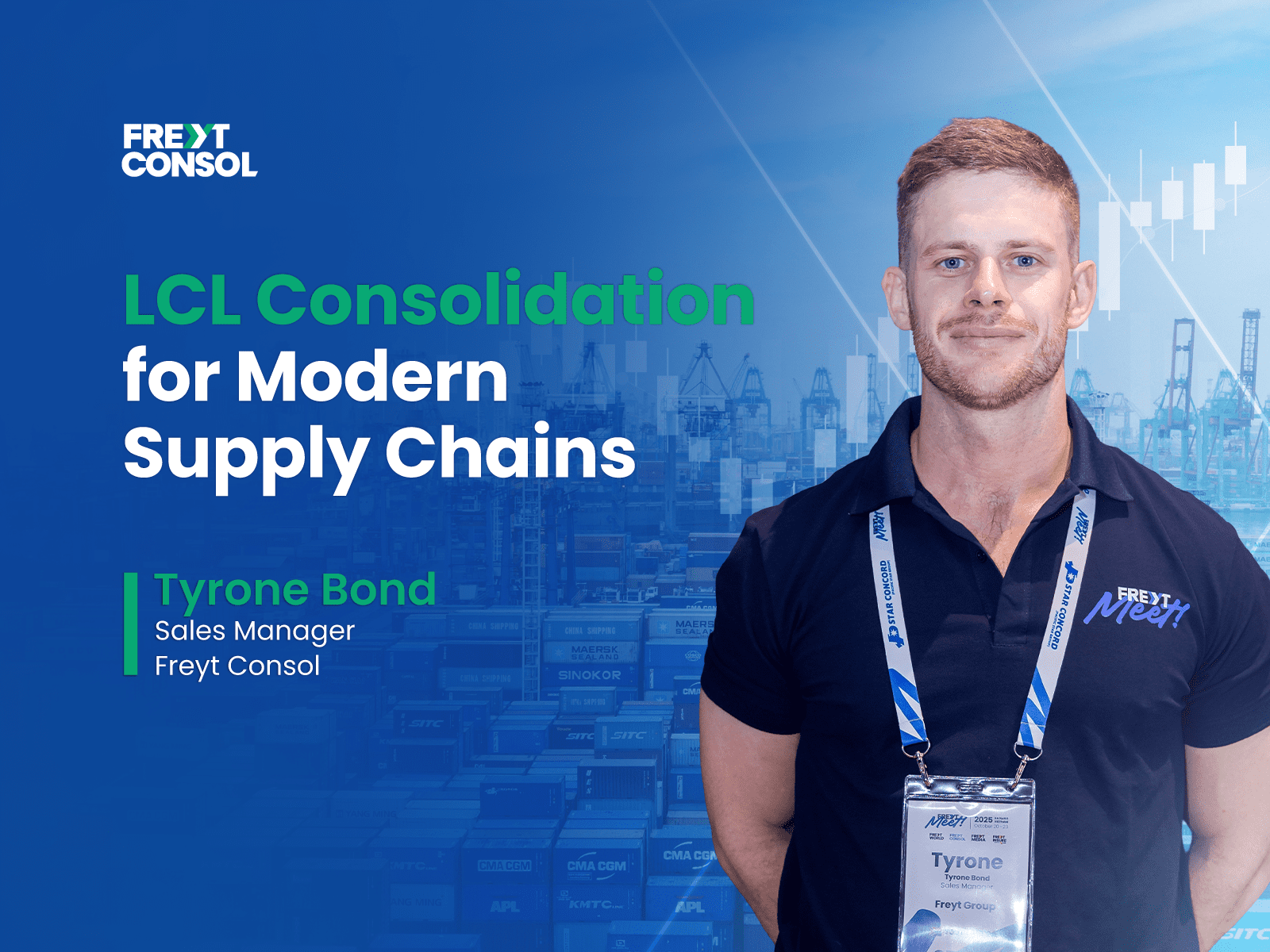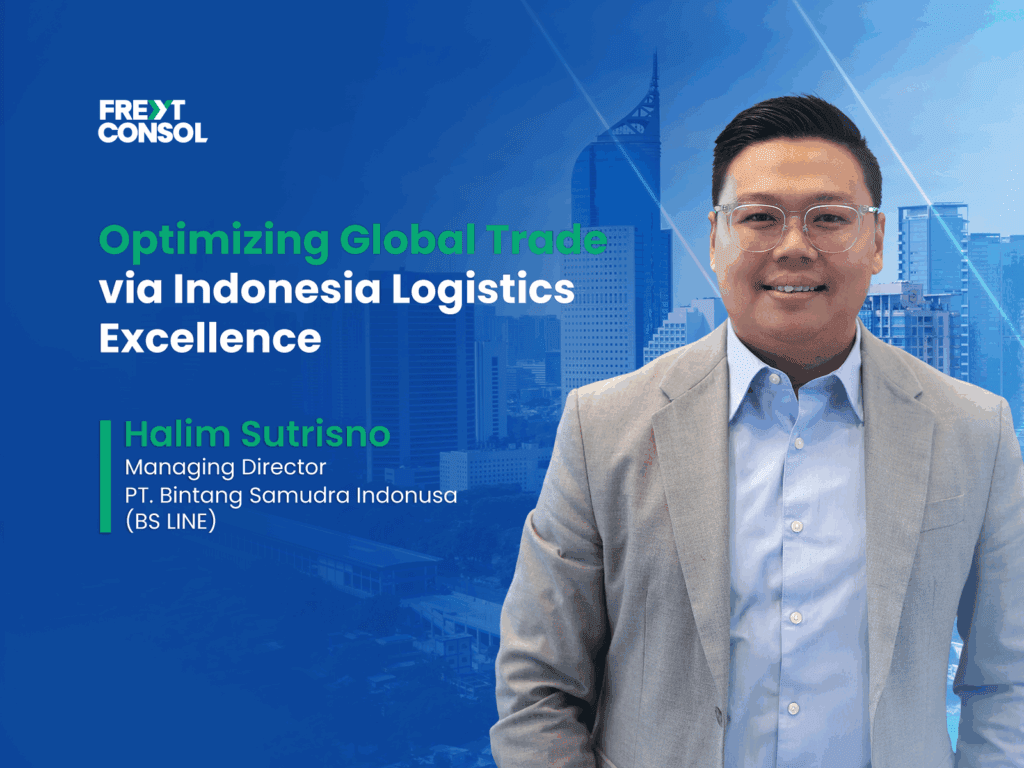By Tyrone Bond, Sales Manager at Freyt Consol

In this industry, efficiency is the ultimate currency and LCL consolidation has long been a game-changing strategy for businesses looking to optimize their supply chains. It allows multiple shippers to share space and cost within a single container. This provides a flexible and powerful alternative to Full Container Load (FCL) shipping, particularly for small to medium-sized enterprises (SMEs) and businesses with fluctuating inventory needs.
However, the consolidation market has profoundly evolved. The foundational benefits of LCL include cost savings, flexibility, and market access. While these advantages remain critical, a new layer of strategic value has emerged that is driven by data and technology. Today, what separates leading LCL providers is not just operational efficiency, but the ability to translate that efficiency into transparent, actionable, data-driven visibility.
In this comprehensive guide, we will explore the timeless advantages of LCL consolidation, examine a real-world case study, address common pitfalls, and uncover how the modern imperative of visibility is shaping the future of supply chain efficiency.
The Enduring Pillars of LCL Shipping
Before diving into the market's evolution, it's crucial to understand the core benefits that make less than container load shipping a cornerstone of modern logistics management.
1. Drastic Cost Reduction and Improved Cash Flow
The most immediate benefit of LCL is significant cost savings. With FCL, you pay a flat rate for an entire container, regardless of how much space you use. LCL operates on a pay-as-you-go model where you only pay for the volume your cargo occupies, typically measured in cubic meters (CBM). This approach democratizes ocean freight and is the essence of cost-effective shipping. This model directly improves cash flow by reducing inventory carrying costs, as you can ship goods when they are ready rather than waiting months to accumulate enough stock to fill a full container.
2. Unlocking Agility for Global Market Reach
Market demands can change in an instant. LCL provides the flexibility to respond quickly, allowing for more frequent shipments of smaller quantities. This is ideal for inventory management on a just-in-time (JIT) basis and for testing new products in international markets with minimal financial risk. LCL removes critical barriers to entry for global shipping. It allows businesses to avoid the high upfront cost and commitment associated with an FCL shipment. This enables businesses to expand their footprint, serve niche markets, and build a more resilient, geographically diversified customer base without a massive capital outlay.
3. Enhanced Reliability and a Greener Footprint
When managed correctly, LCL is a highly reliable shipping method. Partnering with a professional consolidator and a vetted freight forwarding network ensures your cargo is handled by experts. Shipments are carefully loaded, blocked, and braced at a secure Container Freight Station (CFS). This process minimizes the risk of damage during transit. Furthermore, LCL significantly contributes to greener logistics. By maximizing container space, it reduces the total number of containers shipped for the same volume of goods. This leads to fewer truck journeys and more efficient vessel utilization, directly lowering the carbon footprint per shipment.
Case Study: How an E-commerce Brand Leveraged LCL for Growth
To see these pillars in action, consider "Nordic Weave," a fictional but representative e-commerce company specializing in Scandinavian home textiles.
Initially, Nordic Weave shipped FCL containers to its primary market in North America. The company saw growing demand from a niche audience in Australia but faced a problem. Their Australian order volume wasn't nearly enough to justify a 20-foot container, and air freight was prohibitively expensive. Their capital was tied up in slow-moving inventory, and they couldn't react to sales trends Down Under.
By shifting to an LCL strategy, Nordic Weave began sending shipments of 5-10 CBM every three weeks. The results were transformative.
- ∙ Cost Savings: Their per-unit shipping cost to Australia dropped by over 35% compared to their initial air freight quotes.
- ∙ Improved Cash Flow: Capital was no longer locked in a full container's worth of inventory for a single market.
- ∙ Market Responsiveness: When a particular line of merino wool blankets went viral on Australian social media, they were able to dispatch a replenishment shipment within a week. This allowed them to capture the demand spike instead of facing a two-month stockout.
- ∙ Risk Reduction: They could test new product lines in the Australian market with smaller, manageable shipments, gathering sales data before committing to larger stock levels.
Nordic Weave's success illustrates how LCL is not just a shipping option but a strategic business tool for smart, sustainable growth.
Common Pitfalls in LCL Shipping and How to Avoid Them
While powerful, LCL is not without its complexities. New shippers, in particular, can face challenges. Awareness is the key to avoiding them.
1. Hidden Costs: While the initial LCL quote may seem low, it's important to be aware of destination charges. These fees, which can include terminal handling, CFS services, and documentation, can add up significantly.
∙ Solution: Always work with a freight forwarder who provides a transparent, all-inclusive, door-to-door quote. Ask specifically what is included in the destination charges to avoid surprises.
2. Transit Delays: Because LCL involves consolidation at origin and deconsolidation at the destination, there are more handling points than FCL. Delays can occur at the CFS if not managed efficiently.
∙ Solution: Partner with consolidators who have a strong operational track record and offer robust tracking and visibility. A provider who can give you real-time updates on your cargo's status at the CFS is invaluable.
3. Risk of Damage or Loss: Sharing a container means your cargo is moving alongside goods from other companies. Improper packing or poor loading by the consolidator can increase the risk of damage.
∙ Solution: Invest in proper, robust packaging for your products. Crate your goods if possible. Crucially, vet your LCL provider. A reputable consolidator employs experts who are skilled at loading mixed freight securely to prevent shifting during transit.
The New Currency in LCL: Why Visibility is Everything
Avoiding the pitfalls above and maximizing the benefits of LCL in today's market requires more than just a good rate. The consolidation market has changed more in the past five years than in the decade before it. Efficiency alone isn’t enough. Space has become data, and the new currency is visibility.
This concept of visibility goes far beyond a simple tracking number. True visibility means having transparent, real-time access to sailing schedules, capacity, and pricing. The reality is that most LCL providers have strong operations; what they often lack is reach. If their schedules remain hidden in internal databases, the opportunity stays limited. The new generation of consolidation platforms is shifting the focus from simple membership models toward creating visibility that generates movement.
From Visibility to Volume: The Power of Strategic Alignment
Turning visibility into volume is the new frontier of LCL shipping. It’s not just about listing capacity; it’s about making it easily discoverable to the right freight forwarders on complementary trade lanes.
This is the foundation Freyt Consol was built on. It gives consolidators the tools to turn existing strengths into consistent bookings. By integrating schedule visibility across global forwarding communities, members gain access to hundreds of forwarders actively sourcing LCL solutions for clients like Nordic Weave.
This strategic shift extends beyond technology. It is about intent. While traditional networking often produced superficial partnerships, what works now is strategic alignment. This involves matching companies based on real-world trade-lane data and their specific capabilities. Freyt Consol’s Potential Partners Program exemplifies this, matching companies by commercial reality to ensure growth is not just fast, but smart and sustainable. This structure, supported by dedicated account management, ensures that visibility turns into measurable outcomes.
Frequently Asked Questions (FAQ)
- ∙ Q1: How is LCL pricing calculated? LCL pricing is based on the shipment's volume in cubic meters (CBM) or its gross weight in kilograms. The final cost is determined by whichever is greater, a standard known as "Weight or Measurement" or W/M. The rate is applied per CBM or per 1000 kg.
- ∙ Q2: What's the main difference between LCL and air freight? The primary difference is cost versus speed. Air freight is much faster, taking days instead of weeks, but it is also significantly more expensive, especially for denser goods. LCL offers a much more cost-effective solution for shipments that are not extremely time-sensitive.
- ∙ Q3: Is my cargo insured with LCL shipping? Carriers have very limited liability. It is highly recommended to purchase separate cargo insurance for your LCL shipments. This will protect you against loss or damage for the full value of your goods.
The Smart Choice for the Future of Logistics
LCL consolidation has evolved from a simple cost-saving tactic into a dynamic strategic tool for building a resilient, agile, and efficient global supply chain. It offers foundational cost savings and flexibility while adapting to the demands of a data-driven world.
As freight forwarders continue to outsource LCL work to reliable neutral partners, the ability to showcase consolidation strengths through strategic visibility will define market leaders. By combining operational excellence with a commitment to transparency and intelligent alignment, businesses can unlock the full potential of their supply chain efficiency. Leveraging a modern, visible, and connected LCL network is the smart choice for navigating the complexities of modern trade and achieving sustainable growth.

Article written by
Freyt Consol is a global network for LCL consolidators and NVOCCs dedicated to excellence and long-term growth. We create an environment where members thrive by collaborating with trusted partners and accessing essential resources.




